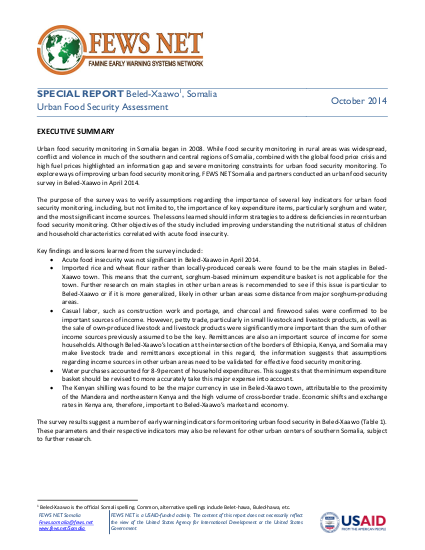
Urban food security monitoring in Somalia began in 2008. While food security monitoring in rural areas was widespread, conflict and violence in much of the southern and central regions of Somalia, combined with the global food price crisis and high fuel prices highlighted an information gap and severe monitoring constraints for urban food security monitoring. To explore ways of improving urban food security monitoring, FEWS NET Somalia and partners conducted an urban food security survey in Beled-Xaawo in April 2014.
The purpose of the survey was to verify assumptions regarding the importance of several key indicators for urban food security monitoring, including, but not limited to, the importance of key expenditure items, particularly sorghum and water, and the most significant income sources. The lessons learned should inform strategies to address deficiencies in recent urban food security monitoring. Other objectives of the study included improving understanding the nutritional status of children and household characteristics correlated with acute food insecurity.
Resource collections
- Evaluating humanitarian action
- Monitoring and Evaluation (M&E)
- Monitoring of humanitarian action
- Somalia humanitarian response
- UN Habitat - Urban Response Collection
- Urban Response - Urban Crisis Preparedness and Risk Reduction
- Urban Response Collection - Community Engagement and Social Cohesion
- Urban Response Collection - Economic Recovery
- Urban Response Collection - Environment and Climate Change
- Urban Response Collection - Housing, Land and Property
- Urban Response Collection - Urban Crisis Response, Recovery and Reconstruction
- Urban Response Collection - Urban Resilience
- Use of evaluation evidence